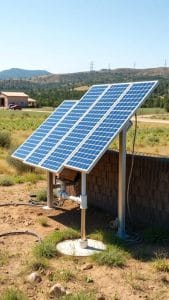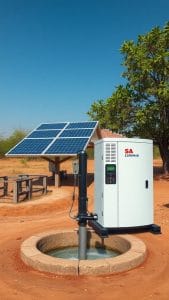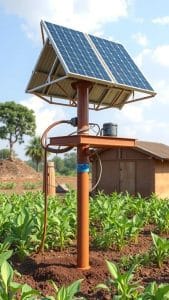The Best Batteries for Solar Power: Choosing the Right Type for Your Needs
Harnessing solar energy is a great way to reduce your carbon footprint, but to make the most of it, you need the right batteries. The best batteries for solar power storage ensure that you have energy when you need it, optimizing your system’s efficiency. With various options available, how do you choose the right type for your needs? Let’s explore some key choices and considerations.
Types of Solar Batteries
When selecting batteries for your solar power system, you’ll typically come across three main types:
- Lead-Acid Batteries: These are the traditional choice, known for their reliability and low cost. They come in two types: flooded and sealed (AGM or gel). While lead-acid batteries have a shorter lifespan (around 5 to 15 years) compared to other options, they work well for short-term storage and backup systems.
- Lithium-Ion Batteries: This newer technology offers higher efficiency and a longer lifespan (up to 20 years) than lead-acid batteries. They are lighter, take up less space, and have a faster charge and discharge rate. Their decreasing cost makes them an attractive option for many solar users.
- Saltwater Batteries: A more environmentally friendly alternative, saltwater batteries use saline solutions instead of heavy metals. While they have a lower energy density than lithium-ion batteries, they provide a safe and sustainable option, especially for those focused on eco-friendliness.
Key Factors to Consider
When choosing the best batteries for solar power, consider these factors:
Inverter Not Working? Get Emergency Repair!
Don't let a broken inverter leave you without power. Our certified technicians provide same-day diagnosis.
Get Emergency Repair Now →1. Capacity
Batteries are rated in amp-hours (Ah), indicating how much charge they can store. Calculate your energy needs by assessing how much power you consume daily. This helps determine the battery capacity you’ll need to ensure you have ample energy during low sunlight periods.
2. Depth of Discharge (DoD)
The depth of discharge refers to how much of the battery’s capacity can be used without damaging the battery life. Lithium-ion batteries generally offer a higher DoD (up to 90-95%) than lead-acid batteries (50-80%). Higher DoD allows you to use more of the stored energy, making lithium-ion a preferred choice for many.
3. Lifespan
Battery lifespan is crucial when considering your long-term investment. Lithium-ion batteries excel in longevity, lasting up to 20 years, while lead-acid typically last between 5 to 15 years. Factor in the replacement costs when assessing the total financial commitment of your solar battery system.
Inverter Not Working? Get Emergency Repair!
Don't let a broken inverter leave you without power. Our certified technicians provide same-day diagnosis.
Get Emergency Repair Now →4. Efficiency
The energy efficiency of a battery indicates how much energy is lost during charging and discharging. Lithium-ion batteries have higher efficiency (up to 95%) compared to lead-acid batteries (70-80%). This difference can significantly impact your overall energy savings and reduces wasted solar power.
5. Price
While lead-acid batteries are generally less expensive upfront, consider total ownership costs over time. Lithium-ion batteries, though more costly initially, provide longer life and better efficiency. Evaluating your budget alongside performance is essential when making your final decision.
Popular Solar Battery Brands
Several reputable brands stand out when it comes to solar batteries. Here’s a shortlist of some options:
Inverter Not Working? Get Emergency Repair!
Don't let a broken inverter leave you without power. Our certified technicians provide same-day diagnosis.
Get Emergency Repair Now →- Tesla Powerwall: A top contender, the Lithium-ion Powerwall offers an impressive capacity and efficiency, making it a favorite among homeowners.
- LG Chem: Known for their high-quality lithium batteries, LG Chem provides both residential and commercial energy storage solutions that promise durability.
- Battle Born: Specializing in Lithium Iron Phosphate (LiFePO4) batteries, Battle Born is an excellent choice for RVs and off-grid applications.
- Renogy: Offering a range of sealed lead-acid and lithium batteries, Renogy is a reliable option for off-grid and grid-tied solar systems.
Choosing the right battery for your solar power system involves considering your energy needs and budget, alongside the various battery types available. By weighing these factors carefully, you can ensure a sustainable and efficient energy solution. The right battery setup not only saves you money in the long run but also maximizes your solar energy investment.
Comparing Battery Lifespan and Efficiency in Solar Energy Systems
When considering solar energy systems, one key factor that can greatly influence your experience is the battery’s lifespan and efficiency. As solar power continues to grow in popularity, understanding how these batteries perform is essential for optimizing your energy setup. Below, we delve into the various aspects of battery lifespan and efficiency that you need to consider.
Solar batteries store excess energy generated by your solar panels for use when sunlight is not available. Choosing the right battery is crucial for ensuring your solar energy system operates effectively. The different types of batteries available can vary significantly in terms of lifespan, efficiency, and cost.
Inverter Not Working? Get Emergency Repair!
Don't let a broken inverter leave you without power. Our certified technicians provide same-day diagnosis.
Get Emergency Repair Now →Types of Batteries for Solar Systems
There are several battery types you might consider for your solar power system:
- Lead-Acid Batteries: This traditional technology is widely used. They are often cheaper upfront but have shorter lifespans, typically lasting 3-5 years. Their efficiency is around 80%, and they require regular maintenance.
- Lithium-Ion Batteries: A more modern solution, lithium-ion batteries are prized for their longer lifespan of 10-15 years and greater efficiency, often exceeding 90%. They are more expensive but need less maintenance.
- Saltwater Batteries: A newer option in the market, these batteries are eco-friendly and can last anywhere from 10-15 years. They are efficient but still developing in terms of performance.
- Nickel-Based Batteries: Less common, these can last up to 20 years, but they are often pricier. Their efficiency can also be on par with lithium-ion, but they require careful monitoring of temperature and usage.
Understanding Battery Lifespan
The lifespan of a battery in a solar energy system often refers to how long it can effectively store and release energy. Several factors influence this longevity:
- Cycle Depth: This refers to how deeply a battery discharges its energy. Batteries that frequently discharge to their lowest levels tend to wear out faster. A good rule of thumb is to aim for a depth of discharge of around 50% for longer lifespan.
- Temperature: Extreme temperatures can affect battery performance. Keeping them in a moderate climate will help maintain their ability to hold a charge.
- Quality: Higher-quality batteries generally have better materials and technology, leading to improved lifespan and efficiency.
Efficiency Considerations
Efficiency in batteries for solar power systems is often assessed through their round-trip efficiency, which measures how much energy you can retrieve compared to how much energy was used to charge them. Factors include:
Inverter Not Working? Get Emergency Repair!
Don't let a broken inverter leave you without power. Our certified technicians provide same-day diagnosis.
Get Emergency Repair Now →- Self-Discharge Rate: This measures how much energy the battery loses when not in use. Lower self-discharge rates are better as they ensure more stored energy for your solar system.
- Charge and Discharge Rates: The speed at which a battery can charge and discharge affects how efficiently it can be integrated with your solar system. Higher rates lead to better responsiveness to solar energy supply and demand.
- Depth of Discharge: As mentioned earlier, how deeply you discharge your battery impacts its overall efficiency. Shallower discharges often lead to less wear and higher efficiency rates.
Choosing the Best Battery for Your Needs
When deciding which type of battery to use in your solar power system, it’s essential to evaluate your specific needs:
- Budget: Consider upfront costs versus long-term savings. While lithium-ion may be expensive initially, its efficiency and longevity can save money in the long run.
- Energy Needs: Analyze your average energy consumption to determine the size and type of battery that fits your lifestyle and energy goals.
- Environmental Impact: If sustainability is a priority for you, opting for eco-friendly batteries like saltwater may align better with your values.
Understanding the lifespan and efficiency of batteries in solar energy systems is vital. The right choice can lead to savings over time, greater reliability, and a more effective solar energy solution tailored to your specific requirements. By weighing the different options and their advantages, you can ensure that your solar system operates smoothly and efficiently for years to come.
Conclusion
Choosing the best batteries for solar power is not just about picking a name from a list; it’s about understanding your unique energy needs and how different types of batteries can meet those demands. Whether you select lithium-ion batteries for their long lifespan and efficiency or opt for lead-acid batteries due to their cost-effectiveness, knowing the characteristics and benefits of each type is essential in maximizing your solar energy system.
Inverter Not Working? Get Emergency Repair!
Don't let a broken inverter leave you without power. Our certified technicians provide same-day diagnosis.
Get Emergency Repair Now →When comparing battery lifespan and efficiency, it’s vital to consider not only how long the battery lasts but also how well it performs over time. Lithium-ion batteries often shine in both areas, providing many cycles and retaining charge capacity longer than their lead-acid counterparts. However, lead-acid batteries may still be an excellent option for those on a budget, primarily if used in appropriate settings where their longevity won’t be compromised.
Ultimately, your choice should align with your power consumption patterns, budget constraints, and space availability. Make sure to weigh these factors carefully. Invest in researching reputable brands, and consider seeking advice from solar energy professionals. With the right battery, you can ensure a reliable, efficient, and sustainable energy solution that supports your lifestyle while being kind to the planet. Remember, the best battery for your solar power system is the one that fits seamlessly into your specific requirements, paving the way for a greener energy future.
Ready to discover your solar potential?
Our calculator shows you exact savings projections for your home.
Inverter Not Working? Get Emergency Repair!
Don't let a broken inverter leave you without power. Our certified technicians provide same-day diagnosis.
Get Emergency Repair Now →







Leave a Comment
Your email address will not be published. Required fields are marked *